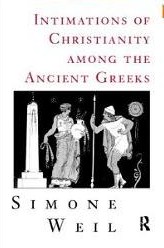Simone Weil
Intimations of Christianity Among the Ancient Greeks

Weil is most intelligible when examining the classical Greek plays and Homer's Iliad than in the rest of the texts. Even though the connections to Christianity are interesting and intriguing, it's rather the straightforwardness of her analysis of the works that make the book delightful to read and illustrative.
The part on Plato's Republic, and on Pythagorean philosophy, are the most far-fetched and boring parts, obviously out of reach to the general reader anyway.
The hypothesis about the origin of the poem The Iliad, first exposed by Thucydides, is very intriguing and beautifully put: "If one believes with Thucydides that 80 years after the destruction of Troy the Achaeans were in turn conquered, one may wonder whether these songs in which iron is so rarely mentioned, may not be the chants of a conquered people of whom perhaps some were exiled. Obliged to live and to die very far from the homeland, and like the Greeks before Troy, having, like the Troyans, lost their cities, they saw their likeness in the victors, who were their fathers, and also in the vanquished, whose sufferings resembled their own (...) they ... thus understand what never the defeated nor the victorious have ever understood, being blinded by one or the other state".
The points in common between Christianity and the Greek classics are to be found deep, so deep that interpretations become blurry and some may collude. That's the quality of classics. They allow, through their inscrutable depth, to be compared with other sublime texts of any other date and place. The author does more for the Greek texts by finding transcendent meaning there, than for the Biblical texts by only using them as the measuring stick against the Greek classics.
All in all, due to the sheer power and depth of her statements, the book is well worth the read, if only for the parts mentioned above.
